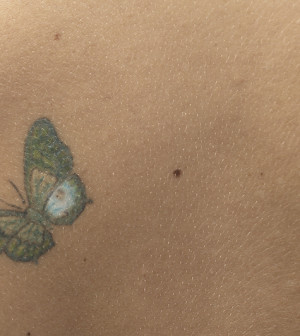- Could Your Grocery Store Meat Be Causing Recurring UTIs?
- Are You Making This Expensive Thermostat Error This Winter?
- Recognizing the Signs of Hypothyroidism
- 10 Strategies to Overcome Insomnia
- Could Artificial Sweeteners Be Aging the Brain Faster?
- Techniques for Soothing Your Nervous System
- Does the Water in Your House Smell Funny? Here’s Why
- Can a Daily Dose of Apple Cider Vinegar Actually Aid Weight Loss?
- 6 Health Beverages That Can Actually Spike Your Blood Sugar
- Treatment Options for Social Anxiety Disorder
Double Up on Acne Treatments, New Guidelines Say

Combining treatments is the best way to combat acne, new guidelines from the American Academy of Dermatology state.
“There are a variety of effective treatments available for acne, and dermatologists have found that combining two or more treatments is the best option for the majority of patients,” Dr. Andrea Zaenglein, co-chair of the guidelines committee, said in an academy news release.
“Recommended treatments include topical [skin] therapy, antibiotics, isotretinoin [Accutane is one brand] and oral contraceptives,” she added.
Acne affects up to 50 million Americans a year, according to the academy.
When using antibiotics to treat moderate to severe acne, prescription skin medications should be used at the same time. After patients complete a course of antibiotics, they should continue using topical, or skin, therapy to manage their acne, according to the guidelines.
Topical medications such as retinoids and benzoyl peroxide can also be used together, the guidelines say.
Also, girls and women with acne may benefit from taking birth control pills, which can be combined with other treatments, the experts noted.
Oral isotretinoin can be used for severe acne that does not respond to other treatments. However, the medication carries a high risk of birth defects, so females must be extra vigilant about preventing pregnancy while taking the drug, the guidelines authors pointed out.
Some research has suggested a link between oral Accutane and inflammatory bowel disease or depression, but the evidence is not conclusive. However, patients should be aware of this and follow their doctor’s advice, the guidelines say.
There is not enough evidence to recommend in-office procedures such as laser treatments and chemical peels, alternative therapies such as tea tree oil, or dietary changes, according to the guidelines.
The guidelines were published recently in the Journal of the American Academy of Dermatology.
More information
The American Academy of Family Physicians has more about acne treatment.
Source: HealthDay
Copyright © 2026 HealthDay. All rights reserved.










